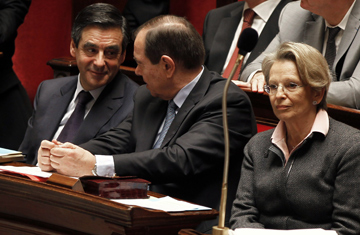
French Prime Minister François Fillon, Minister for Relationships with Parliament Patrick Ollier and Foreign Affairs Minister Michèle Alliot-Marie, from left, attend the government-questions session at the National Assembly in Paris on Feb. 9, 2011
A recent flurry of scandals involving French government figures has served as a painful reminder to the nation of a fact that has long left outside observers aghast: thanks to France's blasé attitude toward conflict of interest, the problem has become common within its political class. But that's about to change. Now French politicians have become so concerned about the public's growing disgust with questionable ethical behavior that the government is preparing a law to define and outlaw conflict of interest among officials. But France may not be so quick to embrace the change, with several leading political figures warning that the new strictures would undermine the democratic system.
President Nicolas Sarkozy's conservative government has been rocked by a succession of scandals over the past nine months, including two recent cases of conflict of interest involving top Cabinet members. In early February, France's Foreign Affairs Minister, Michèle Alliot-Marie, came under fire when it was revealed that during her Christmas vacation in Tunisia, she had flown — for free — on a private plane belonging to a rich businessman close to the country's now deposed President, Zine el Abidine Ben Ali. French Prime Minister François Fillon vigorously defended Alliot-Marie against accusations that she had improperly benefited from the largesse of Tunisia's ruling elite even as it was being challenged by popular revolt. Then the nation learned that while Fillon and his family were on vacation in Egypt at the end of 2010, they had been hosted by then President Hosni Mubarak. Even though, unlike Alliot-Marie's Tunisian holiday, Fillon's visit to Egypt predated the successful uprising against the regime, the facts that his personal holiday had been paid for by the Egyptian strongman and that he'd kept mum about it while defending his fellow Cabinet member struck many as the worse of the two conflicts of interest.
Even before this latest batch of scandals, conflict of interest had been an issue for the government. For most of last summer, former Labor Minister Eric Woerth was dogged by accusations of conflict of interest arising from a complex affair involving billionaire L'Oréal heiress Liliane Bettencourt and the conditions under which Woerth's wife landed a job with a company that manages Bettencourt's fortune. In July, meanwhile, two Cabinet members were forced to resign after it was discovered that they had used public funds for questionable expenses — one spent $157,000 to charter a private jet for an official overseas trip; the other plunked down more than $16,000 in taxpayer money to buy Cuban cigars.
The resulting uproar led Sarkozy — who himself has been criticized for allowing rich industrialist friends to finance his vacations — to ask a committee of experts to propose a series of legal restrictions and ethical codes of conduct for public officials. After receiving that report on Jan. 26, Sarkozy said he would use it as the basis of legislation he will introduce later this year.
The report calls for prohibiting most elected officials and government members from entering into situations in which their private interests could feasibly color their official decisions — a long-standing given in most developed countries. It suggests banning Cabinet members from holding additional public offices or party positions, which is currently a common practice in France, where many Cabinet members are also mayors or regional councilors. It also recommends creating independent bodies to watch for and examine potential conflict-of-interest cases in public life and limiting the value of any gifts that officials can accept to $200.
Some critics complain that the rules exempt French legislators — a group expected to now establish the conflict-of-interest rules for its own members. However, observers otherwise applaud the proposed measure for taking aim at a problem that has been rife in the French government — both on the left and the right — for decades. "In recent years, the French public has begun rejecting the long-held attitude of politicians that their positions in power somehow allow them to play by different rules than everyone else," says Daniel Lebegue, president of the French affiliate of the anticorruption organization Transparency International. Last year, Transparency International's annual poll measuring how vulnerable national populations think their countries are to corruption ranked France 14th out of 27 European countries — ahead of the most susceptible states, like Bulgaria, Romania and Russia, but far behind Britain, Germany and Scandinavian countries. "Fully 67% of French people say the risk of corruption here is significant," says Lebegue. "And if we're seeing politicians moving to pass a law to address that, it's because the public isn't leaving them a choice."
Don't tell that to Fillon, who called the proposals "curious." He, like other conservative critics, particularly dislikes the recommended ban on multiple mandates, which Fillon called "contrary to democracy." Jean-François Copé, head of the ruling Union for a Popular Majority (and a legislator who also works as a business lawyer) has even called the conflict-of-interest law "a Pandora's box" whose restrictions would result in "no one [wanting] to enter politics."
Lebegue says the backlash is to be expected, but it won't be effective: "[Some officials] may not like the coming law, but the public does — and that's why it's going to become reality."
